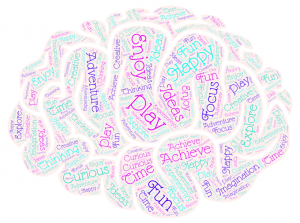In The Moment Planning
In the Moment planning
Children learn and experience in the here and now and don’t store up their questions and curiosities to ask tomorrow or the next day. It is at that moment of curiosity, interest or question that they are teachable, where the adult can step in with the answer or encouragement. By using this cycle on a moment-by-moment basis the adult will always be alert to individual children (observation), always thinking about what it tells us about the child’s thinking (assessment), and always ready to respond by using appropriate strategies at the right moment to support children’s wellbeing and learning (planning for the next moment).
It is all about capturing the children’s current interests at that particular time. There is no need to plan in advance as this form of planning is based on what the child is doing and practitioners interact with the child to build on this (in the moment). Practitioners have the necessary skills to identify the child’s interests and know when and how to intervene and help move the child’s learning on.
This type of planning is simple and effective as it allows those crucial moments to be captured and extended there and then rather than introducing these next steps in a week or two, it is child lead and real-time planning. Children’s current interests are identified regularly and practitioners can plan and evaluate from day to day as opposed to week by week.
We have recently overhauled our planning process in favour of this system which brings you the parents into our planning structure by giving an in-depth insight into what your child’s life is like at the nursery. We refer to this as ‘in the moment planning’ which ensures that the setting is more child-led, giving them free will when it comes to making choices. We have restructured the way we store play items and toys, so that children have power to choose when it comes to what to play with and how to play with it. This offers an enabling environment and allows children to explore and investigate using their own initiative. Observation, assessment and planning are all carried out by a moment-by-moment basis. This will however mean that there will be less information uploaded onto tapestry because the focus is on the child not on paperwork.
Each child will be a ‘focus child’ at least once a term, with observations on all children still being carried out. When your child is due to be a ‘focus child’, you will receive a parent consultation sheet to fill in the week before, as we value your understanding and knowledge of your child, and we would like you to share anything significant happening in your child’s life at the moment. Working together, we will plan activities to meet your child’s needs, and plan for their future learning and development.
